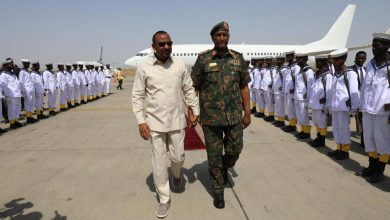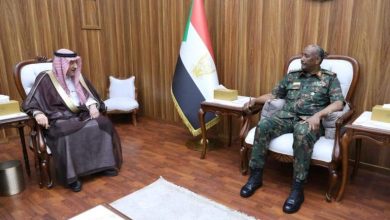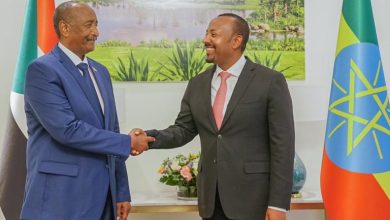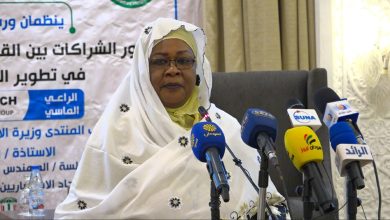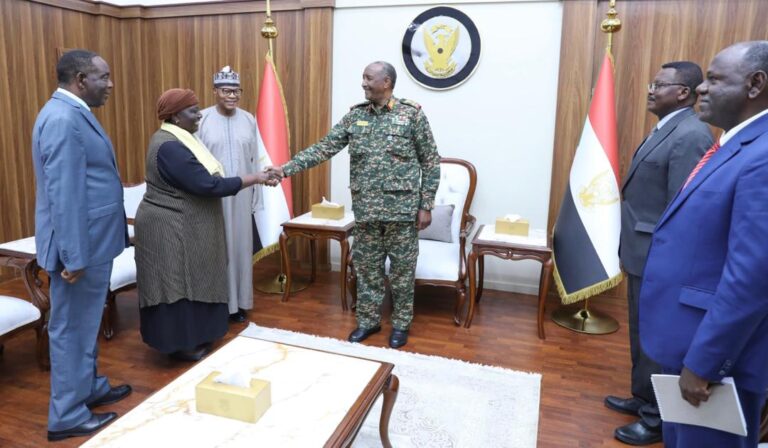
Al-Mohagig – Talal Ismail
In its quest to find a solution to the Sudanese crisis, the African Peace and Security Architecture (APSA) delegation recently arrived in Port Sudan, Red Sea State, to assess the situation amidst numerous challenges facing its work. The political scene has become more complicated since the outbreak of war in mid-April, and the relationship between Sudan and the African Union (AU) itself is not in good shape. The difficulty of the APSA’s task is compounded by the failure to implement the Jeddah Agreement between the Sudanese army and the Rapid Support Forces (RSF) militia.
Al-Burhan’s Conditions
Sudanese Sovereignty Council President Abdel Fattah Al-Burhan met with a high-level African Union APSA delegation led by Mohamed Shinnawi. The APSA was formed in January of last year to resolve the Sudanese crisis, which has exacerbated and cast its shadow on neighbouring countries and diplomatic relations with countries accused by Sudan of fuelling the war.
Al-Burhan briefed the APSA’s delegation on the political developments in Sudan since the RSF’ coup and rebellion against the state and the violations committed against civilian citizens, according to a statement from the Sovereignty Council.
Al-Burhan expressed Sudan’s confidence in the AU and its potential solutions, provided Sudan restores its trust in the AU by dealing with it as a full-fledged member.
The AU suspended Sudan’s membership following the measures taken by Al-Burhan on October 25, 2021, to dissolve the Sovereignty Council and the Council of Ministers and dissolve the partnership with the Central Council of Freedom and Change.
Al-Burhan explained to the APSA delegation that the solution lies in the withdrawal of rebel forces from the cities and villages they have occupied, displacing their inhabitants.
The Sudanese army signed an agreement with the RSF militia in Jeddah under Saudi-American sponsorship, which includes clauses for the evacuation of the militia from the homes of citizens and civilian property and the facilitation of humanitarian aid.
Roadmap
At the end of last May, the AU announced a roadmap to resolve the Sudanese crisis, including a series of measures to resolve the conflict, including an immediate and permanent cessation of hostilities.
The roadmap includes six items, including that the expanded APSA formed by the AU should ensure the coordination of all regional and international efforts to resolve the Sudanese crisis.
The roadmap stipulates the urgent, permanent, and comprehensive cessation of hostile acts and effective humanitarian response to the consequences of the conflict.
It also emphasises the protection of civilians and civilian infrastructure, with full compliance with international humanitarian law and recognition of the pivotal role played by neighbouring countries affected by the conflict.
It also stressed the need to complete the comprehensive transitional political process, with the participation of all Sudanese parties, and the formation of a democratic civilian government.
Parties’ Vision
In a meeting between the APSA and Sudanese parties and political blocs in Port Sudan, Red Sea State, People’s Congress General Secretary Amin Mahmoud said at the outset of the National Front parties’ talks that external efforts have focused on the solution because they do not know the power and popularity of Sudanese parties and have continued to focus on forces that have no popular base, failing to express the views of the Sudanese people on the Sudanese political crisis.
The General Secretary also expressed regret for the AU’s abandonment of the Sudanese people facing a situation unprecedented in humanity in wars at all, and that the AU remained silent in the face of many of its countries allowing African mercenaries to enter Sudan through its borders and then return through the same ports, laden with what they looted from the property of the Sudanese people, as well as its shameful silence towards the United Arab Emirates for fuelling the war in a country that is a founding state of the AU, according to a statement issued by the People’s Congress following the meeting.
The statement said that the components of the National Front attending the high-level tripartite APSA meeting conveyed a unified opinion on four basic issues: supporting the Sudanese Armed Forces as a national and nationalist institution responsible for protecting the country, land, and people, emphasising the necessity of Sudanese-Sudanese dialogue within Sudan without exclusion; protecting national sovereignty and rejecting negative external interventions as in the case of the United Arab Emirates, in addition to the necessity of condemning the violations committed by the RSF against Sudanese citizens.
On the other hand, the Political Secretary of the Future Movement for Reform and Development, Hisham Osman Al-Shawani, said: “We all affirmed to this African committee our supportive stance for the sovereignty of the Sudanese state and our support for a national process to address the crisis of war. We discussed with them the role of the AU in recent years and its loss of identity in suspicious initiatives that do not support a solution in Sudan.”
He added: “We welcomed their visit to Sudan as a correct start that confirms the committee’s recognition of the state’s institutions and indicates an initiative to meet all parties, which is a path that should be encouraged.”
He continued: “It has been clarified that the problem faced by the APSA under Thabo Mbeki’s chairmanship was the absence of inclusivity, which the regime rejected at the time, which complicated the political situation in Sudan and blocked the path of reform. The same mistake was repeated after 2019. From these experiences, we must learn that inclusivity is an important and fundamental principle. I stressed to the committee the importance of understanding that representing Sudanese is a complex issue and it is necessary to know that this small group outside the country from some political forces represents a specific group with narrow interests and suspicious ties to external axes. It is important to realise the difficulty of representing all Sudanese without recognising the complexity and without applying the principle of inclusivity practically.”
Regarding the reality of the war, Al-Shawani told the APSA: “It is necessary to support the Jeddah Declaration signed on May 11 as a necessary entry point for settling the crisis. The platforms must be unified away from the race, starting from the principle of not equating the Sudanese Armed Forces with the RSF militia. Comparing them is not permissible. This approach specifically ensures peace and security in the region and the continent. It stresses that there should be no political process before the cessation of war. No political process outside Sudan and the need to encourage (Sudanese-Sudanese dialogue) on comprehensive foundations, and its methodology should be different from what was known as the Framework Agreement, which was the cause of war and conflict.”
Civil Society
In its search for forming a comprehensive vision of the crisis and approaching solutions, the APSA held meetings with multiple-interest civil society organisations and examined their vision for ending the war and addressing humanitarian issues.
The APSA delegation is expected to summarise its activities in a detailed report to be presented to the African Peace and Security Architecture, based on which it will approach the solution in Sudan. It is not unlikely that the new approach will be similar to that taken by the Economic Community of West African States (ECOWAS), which decided to unfreeze the membership of four countries and involve their existing authorities in discussing solution options.


